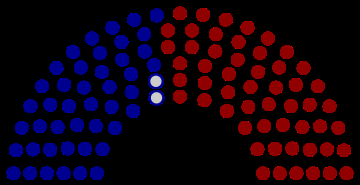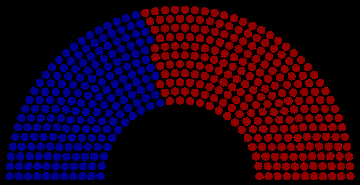
Senate political groups
- Republican (54)
- Democratic (44)
- Independent (caucusing with Democrats) (2)

House of Representatives political groups
- Republican (247)
- Democratic (188)
But there is a question that we need to ask ourselves. Could either Clinton or Sanders actually accomplish anything once elected? I'm not questioning the abilities of either, but there is a fly in the ointment -- the United States Congress. Currently, the Republicans have an 8 vote edge in the Senate, and a 59 vote edge in the House of Representatives. If Congress still looks like that after the 2016 election, a Clinton or Sanders presidency will look a whole lot like the recent Obama presidency -- where no progressive change could get through Congress (and only small changes could be done through executive orders).
I can understand the passion being evidenced by Clinton and Sanders supporters, and I'm happy to see it. Democrats should be fired up by these two candidates, and they should vote their conscience in the primaries. But Clinton and Sanders are not the problem -- Congress is the problem, and we need to start paying a lot more attention to who gets elected to the next Congress. That matters more than whether it is Clinton or Sanders that is our next president.
There is some good news. Democrats have a very good chance to flip control of the Senate back to the Democrats. It won't be easy, but it is doable if Democrats turn out in large numbers and make sure they vote for down-ballot Democrats.
The real problem is the House of Representatives. Virtually no political pundits give Democrats much chance to flip the House. For instance, the respected Cook Political Report now thinks that only 33 of the 435 House seats are competitive. Democrats would have to win all 33 of those seats to even come close to taking control of the House (which is unlikely), and they would still be three seats short (because some of those competitive seats are already in Democratic hands).
Congress is very unpopular these days, with a job approval rating in the teens -- and one might think that is the prescription for an upheaval in the coming election. It would be, except for one thing -- gerrymandering. The Republicans were able to do some substantial gerrymandering after the 2010 census -- and that gerrymandering is why they were able to keep control of the House in the 2012 election, even though GOP House members received one million fewer votes than Democratic House members. This creation of safe GOP seats through gerrymandering is sure to play a big part in the 2016 election (and probably 2020 also).
I'm not saying that flipping the House to Democratic control is impossible -- only that it will be very difficult to accomplish. But it is crucial if a Clinton or Sanders presidency is to accomplish anything at all. Democrats need to start paying as much attention to the congressional races as they currently are the presidential race. And they need to get busy helping down-ballot Democrats to be elected.
I know there are some in both the Clinton and Sanders camps who are declaring they wouldn't vote for the other in the general election. That's sad and ridiculous. But I urge those people, even if you can't (or won't) vote for the presidential nominee, don't stay and home and refuse to vote at all. Go to the polls and vote! Even if you leave the presidential slot blank (or vote third party), it is very important that you vote for down-ballot Democrats. There is just too much at stake to sit out this coming election.

